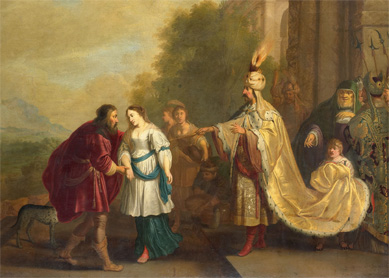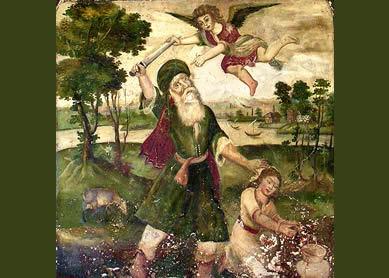Son of Abraham and father of Jacob, Isaac is the middle of the three patriarchs of the people Israel. He stands at the center of complicated relationships with enough drama to fill a reality TV series. His birth to Abraham’s postmenopausal wife Sarah represented the culmination of a long struggle to reconcile God’s promise to make Abraham the ancestor of a great nation with the realities of the couple’s childlessness and advanced age. Prior to Isaac’s birth, Sarah had pursued the path of surrogacy, encouraging Abraham to father a child (Ishmael) with her maidservant Hagar. However, she was unhappy with the result, leading to the eventual expulsion of Hagar and Ishmael from the household. Shortly thereafter, God ordered Abraham to sacrifice Isaac, intervening at the last minute after observing Abraham’s willingness to carry out the command. Isaac married his cousin Rebekah, and they became the parents of twins Esau and Jacob.
Isaac and Ishmael: Friends or foes?
“Sarah saw the son of Hagar the Egyptian, whom she had borne to Abraham, playing [with her son Isaac]. So she said to Abraham, ‘Cast out this slave woman with her son; for the son of this slave woman shall not inherit along with my son Isaac.’” (Gen 21:9-10)
The Hebrew word for “playing” is a pun on Isaac’s name, so the phrase “with her son Isaac” may have been added to the text when it was translated from Hebrew to Greek to help readers recognize the linguistic connection to Isaac in what Sarah saw. But what did Sarah see that prompted such a vehement response? It’s possible that she was provoked by the very sight of Ishmael, especially if she had hoped to be rid of Hagar since before he was born (Gen 16:6). Or she may have seen Ishmael being unkind to Isaac or engaging in some other objectionable activity. Alternatively, she may have seen the boys playing happily together and perceived a threat in the presence of an older brother who might become a rival to her son (in Hebrew, Ishmael’s “playing” is also Isaac-ing).
Genesis reports that the brothers came together to bury Abraham (Gen 25:9) but does not otherwise explore their relationship. Instead, it uses them to illustrate the complicated relationship between their mothers and the entire household’s wrestling with how God’s promise to Abraham will be fulfilled.
Sarah’s demand for Hagar and Ishmael’s expulsion comes immediately after Isaac has been weaned (Gen 21:8), raising the possibility that Hagar may have been his wet nurse. Given Sarah’s stated plan to claim Ishmael as her own son (Gen 16:2), there may be a certain fluidity in the relationships between the mothers and the sons. Readers should not be too quick to accept Sarah’s neat division of the household. Both women potentially stand in a mothering role toward both children.
Why doesn’t Isaac make a stronger impression?
Isaac is the middle patriarch who easily gets lost in the shuffle. His personality doesn’t come across as vividly as that of his father or son. In his own generation, his wife Rebekah acts more decisively to advance the project God began with Abraham. Genesis relates almost every significant event in his life from someone else’s point of view: Abraham’s perspective on the near-sacrifice, an unnamed servant’s perspective on his betrothal, Jacob’s and Esau’s perspective on their rivalry over birthright and blessing. His story emerges in bits and pieces, squeezing into the cracks of more memorable stories focused on his sons. Yet Genesis also highlights him. Repetitions of the phrase “these are the generations of” divide the book into sections, and one of those sections is devoted to the generations of Isaac.
As it turns out, the two most distinctive features of the treatment of Isaac converge; Isaac’s strange, abbreviated story corresponds to his strange, abbreviated relationship with his brother. In lacking a sustained, intimate relationship with a rival, Isaac stands out among the founding ancestors of Israel (compare Abraham and Lot and Jacob and Esau). God may work differently with each member of those pairs, but that doesn’t diminish the importance of their relationships to one another. Genesis drives that point home through the Joseph story (Gen 37-50), which concludes the book with an extended exploration of the key theme of sibling rivalry. The connection between human reconciliation and divine blessing emerges most forcefully there, but it is present throughout Genesis. Ishmael’s departure diminishes Isaac and his ability to represent a family called to epitomize interdependence across difference.
Bibliography
- Mbuvi, Amanda Beckenstein. Belonging in Genesis: Biblical Israel and the Politics of Identity Formation. Waco, TX: Baylor University Press, 2016.
- Spiegel, Shalom. The Last Trial: On the Legends and Lore of the Command to Abraham to Offer Isaac as a Sacrifice. New York: Pantheon, 1967.
- Kaminsky, Joel S. Yet I Loved Jacob: Reclaiming the Biblical Concept of Election. Eugene, OR: Wipf & Stock Publishers, 2016.





